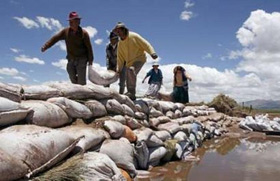 |
 |
 |
 News from Around the Americas | February 2006 News from Around the Americas | February 2006  
Rising Waters, Landslides Wreak Havoc in Bolivia
 Reuters Reuters


| | Bolivian peasants carry sand bags to reinforce a barricade in the river Guaquira 100 Km (63 miles) Northwest of La Paz, February 16, 2006, which days earlier burst its banks, flooding homes and crops. Weeks of heavy rainfall across Bolivia prompted the new government of President Evo Morales to declare a nationwide state of emergency. (Reuters/David Mercado) |
Belen B, Bolivia — Thousands of Bolivian villagers living on the fringes of Lake Titicaca have lost homes and crops following weeks of heavy rain that led the government to declare a state of emergency.

Across Bolivia, tens of thousands of people have been hit by floods and landslides and more than 20 have been killed, presenting President Evo Morales with his first natural disaster since he took office last month.

Lake Titicaca has been rising about one inch per day in recent weeks, devouring hundreds of yards of the fertile shoreline, where mud-brick cottages stand amid plots of flowering potatoes, peas and pasture.

The tiny lakeside village of Belen B was flooded for days after a river burst its banks.

"For a while the river and the lake joined into one. We have lost animals and our harvests have been ruined," said Paulino Quispe, who lives in the village, about 60 miles northwest of La Paz.

Potato plants were saturated and gulls floated on the pond that was the village's soccer field.

"We have been promised help, but up until now none has arrived," Mayor Nixon Mamani of nearby lake port Guaqui said on Thursday.

Titicaca, the world's highest navigable lake, swelled to a height of 12,500 feet earlier this week, just shy of the 12,504-foot record set in 1986, according to the government news service ABI.

At Guaqui, close to the Peruvian border, port officers said the waters had risen nearly 14 inches in a month. It is estimated that for every quarter-inch the waters rise, the lake advances two or three yards into shore.

Six of Bolivia's nine provinces have been hit by the rain, with the worst damage in lowland Santa Cruz, Amazonian areas and La Paz province, which includes the shores of Lake Titicaca.

Morales toured the flooded areas around the lake and to the west of La Paz in the Andean plateau on Wednesday. Earlier in the week he announced $200,000 to help La Paz province, while Venezuela and the United States have pledged aid for flood victims.

But help has not reached Belen B, where residents said they had appealed for seeds so they can replant the crops that would have been ready to harvest in May.

Taking advantage of a sunny afternoon on Thursday, the residents of Belen B stacked sandbags to plug the hole in the riverbank that swamped their fields over the weekend.

"We've lost a lot of our harvest and the water got inside our homes," said Demi Yolanda Callisaya, taking a break from the repair work. "Some things were swept away by the river. It's not like the lake, the current was so strong." | 
 | |
 |



